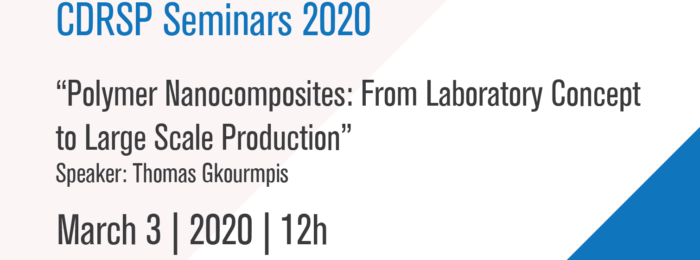Seminar | Polymer Nanocomposites: From Laboratory Concept to Large Scale Production | 03-03-2020 | 12:00h
Polymer nanocomposites combine the properties of the matrix with those of the filler additive. This opens a wide range of possibilities and allows for the creation of fundamentally new materials that exhibit improved mechanical, electrical and thermal properties. This combination of filler and polymer allows for immense versatility and design capabilities and as consequence research in nanocomposites has been ever-growing. Traditionally carbon black has been the filler of choice due to its relatively simple structure, product versatility and reduced cost.
Over the years more advanced carbonaceous fillers like fullerenes, nanotubes or graphene have been developed spearheading a revolution in the area of polymer nanocomposites. Due to their anisotropic dimensions and unique geometry these advanced fillers allow for the creation of extended network structures in the matrix with minimal concentrations. The main advantage of carbonaceous fillers is their tendency to allow for electrical conductivity, but if this is not desirable then options like glass fibres, talcum or even clays are available offering significant performance enhancements, especially in terms of mechanical reinforcement. In this presentation, we will discuss the various challenges that arise from commercial production and use of polymer nanocomposites, especially the issues around melt mixing and dispersion.
We will examine the role of thermodynamics during the mixing process as well as the influence of the chain conformation along various length scales in facilitating the efficient dispersion of the filler into the matrix.
Thomas Gkourmpis | Borealis AB, Sweden and Chalmers University of Technology in Gothenburg Sweden.
Thomas Gkourmpis is a Senior Scientist in Borealis AB in Sweden and a Visiting Scientist in Chalmers University of Technology in Gothenburg Sweden. He holds a BSc in Electrical Engineering from the Technical University of Athens Greece, and an MSc and PhD in Physics from the University of Readin UK. His research is focused on the molecular organisation of amorphous and semi-crystalline polymers their performance and their processing using computational models coupled with time resolved neutron and x-ray scattering. Currently he is working on a series of projects aiming to understand the fundamental structure-property relationships in polymer nanocomposites for a number of technologically and commercially important applications.





